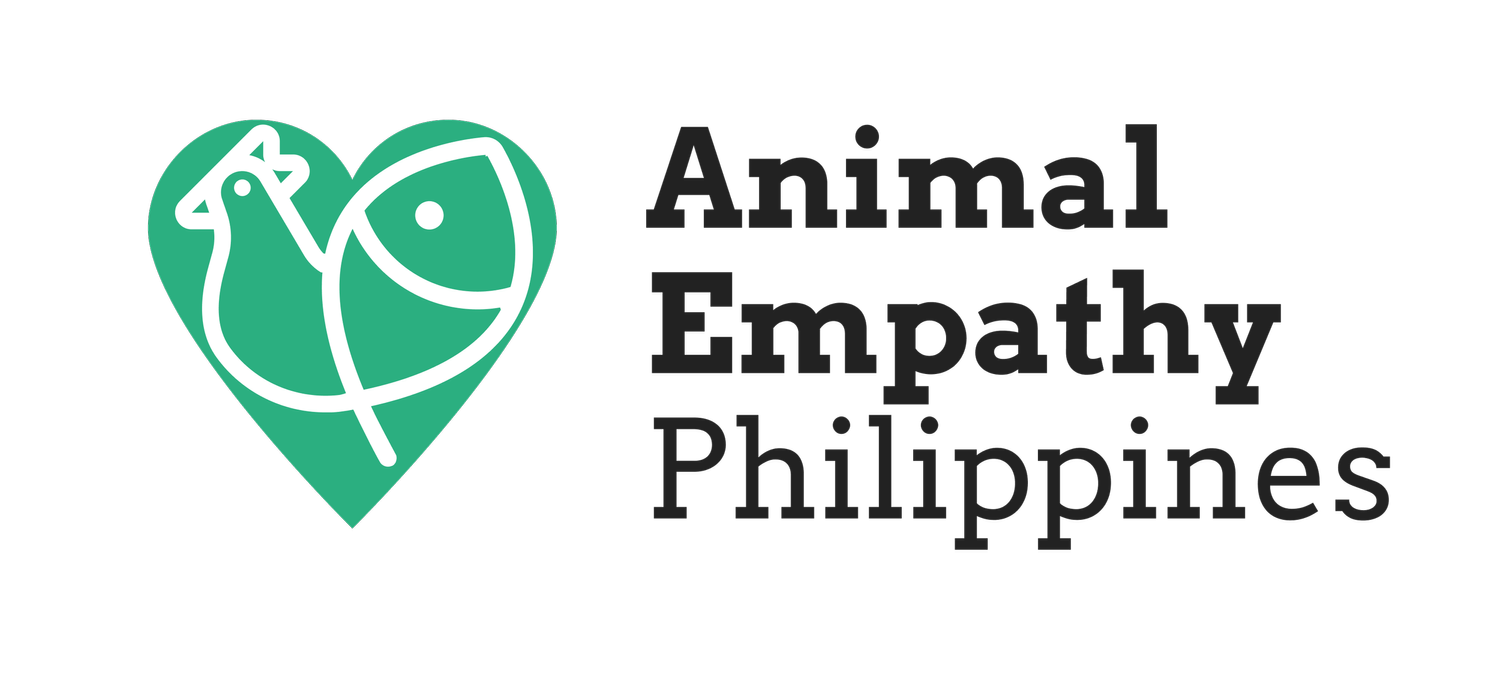Empathy in Action: A Workshop on Farmed Animal Advocacy
Written by Julia Dolfo De Castro (AEP’s Learning and Development Associate)
AEP strategies post-pandemic
This year, as the COVID-19 pandemic dies down, Animal Empathy Philippines (AEP) decided to shift from virtual engagements to in-person events for the first time since its founding in September 2021.
This shift aligns with AEP's core mission of nurturing a community deeply committed to helping farmed animals.
The online and offline meet-ups certainly had their own advantages and disadvantages, and these certainly informed AEP’s planning of subsequent capacity- and community-building events. With online events, participants from Luzon, Visayas, and Mindanao were able to attend and enrich the discussions. Meanwhile, with offline events, interactions and friendships were noticeably formed.
Recognizing the value of these personal connections, AEP was inspired to conduct its capacity-building project face-to-face, aiming to further cement the bonds within the animal advocacy community and enhance our collective impact on farmed animal advocacy.
Brainstorming Empathy in Action
Since its inception, AEP has hosted one fellowship that aimed to help improve animal advocacy in the country: the Animal Advocacy Introductory Fellowship (AAIF) in 2022. AAIF’s curriculum was adapted from Animal Advocacy Careers’ Introduction to Animal Advocacy online course.
In the said fellowship, fellows have learned about the different problems of animals of any kind (be it farmed animals, wild animals, marine animals, animals used in labs, etc.). Fellows showed a strong motivation to take action for animals and give helpful insights on why the problems of animals are neglected even when they are large in scale. As a culminating effort, they presented their capstone projects**, showcasing some practical solutions and initiatives.
To empower advocates in their efforts to amplify the voices of animals, AEP opted to give a series of three in-person workshops focused on farmed animal advocacy that culminates in a capstone project. Empathy in Action is thus a workshop series on how advocates can effectively put their empathy for farmed animals into action where the capstone project is their proposed action for famed animals.
Empathy in Action aimed:
To help farmed animal advocates identify their values and roles and therefore empower them in their advocacy efforts
To help farmed animal advocates use their skills and talents in amplifying the unheard (or misheard) voices of farmed animals
To foster a supportive and collaborative environment among farmed animal advocates in the Philippines and thereby increase the number of farmed animal advocates
The workshop series was open to individuals who want to learn about farmed animal advocacy and who are interested in advocating for farmed animals.
━━━━━━━━━━━━━━━━━━━━━━━━━━━━━━━━━━━━━━━━━━━━━━━━━━━━━━━━━━━━━
1 The first-ever fellowship focused on farmed animal advocacy in the Philippines was pioneered by Effective Altruism Philippines (EA PH) in 2021. EA PH co-founder Kate Lupango organized the Effective Animal Advocacy Fellowship with Ging Geronimo and Giana Nuncio. The program offered an insightful exploration into crucial aspects of effective animal advocacy, shedding light on the broader animal advocacy community and highlighting career paths that could significantly benefit animal welfare. Recognizing the promising impact of having a dedicated community of farmed animal advocates in the Philippines, Kate and Ging were inspired to officially establish AEP as an organization on September 4, 2021.
2 AEP pushed through with some of the capstone projects that were presented by the AAIF fellows. Alaina Amilanto’s article on sabong (cockfighting) was published in Manila Bulletin’s Animal Scene magazine. Anna Valino’s artworks were used in some of AEP’s publicity materials. Jimboy Asoy’s research on Good Animal Husbandry Practices in Capiz State University is currently being conducted in partnership with AEP and is set to be completed next year.
━━━━━━━━━━━━━━━━━━━━━━━━━━━━━━━━━━━━━━━━━━━━━━━━━━━━━━━━━━━━
The Workshop Series
Before the three in-depth workshops, Empathy in Action began with a kick-off workshop that offered a sneak peek into farmed animal advocacy, where participants learned the arbitrary differences between companion animals and farmed animals. Participants learned that companion animals are those that we share a life with and that farmed animals are those we normally, in our society, utilize for food, clothing, and farming methods.
In the sneak peek session, participants realized that not only are the animals we usually consider as companions farmed in other cultures and countries, but also that farmed animals (like Esther the Wonder Pig) can be great companions too. From their group sharings, they learned that farmed animals feel pain and joy too just like their beloved companion animals.
From discovering that they can have empathy for farmed animals, they learned that they can turn that empathy into action and advocate for farmed animals. They learned that as humans, they have a voice and that we can use this voice to amplify the often misheard or unheard voices of farmed animals. They then reflected on their values as advocates and identified their skills that they can use to achieve the desired end for farmed animals.
Following the sneak peek session (Week 0) were the three in-depth workshop sessions (Weeks 1–3).
Week 1 of Empathy in Action aimed to understand the why of farmed animal advocacy. Thus, in the first in-depth workshop, participants learned that farmed animals (from vertebrates to invertebrates) are sentient beings. For many advocates, that animals are sentient is enough “why” for us to advocate for farmed animals. However, as the participants learned from a role-playing activity regarding multi-stakeholders in the agri-food chain (farmers and fisherfolk, businesses, and consumers), the realities suffered by farmed animals are much more complex. The realities of farmed animals are complicated by a systemic way of perceiving them: speciesism.
The participants understood that farmed animals, as sentient beings, can be stakeholders too. They have an interest in living freely and with autonomy and the challenge for us as advocates is to learn how to respond to the voice of farmed animals staking a claim for their interests.
Participants shared that the role-playing activity made them see the problem of animal farming as a systemic problem that demands engaging with farmer and fisherfolk communities who live closest to farmed animals, communicating or negotiating with policymakers, and collaborating solutions with various sectors, rather than simply committing to a lifestyle change.
Participants of Week 1 Empathy in Action
A participant presenting the capacities and challenges of consumers.
Participants presenting the capacities and challenges of businesses.
Week 2 of Empathy in Action, or the second in-depth session in the workshop series, explored the various ways of helping farmed animals. Participants learned to look at the problem of animal farming using EA’s ITN Framework.
Participants learned that in terms of scale or importance, animal farming is a really big and complex problem that has catastrophic consequences, such as the following:
Animal agriculture is one of the leading drivers of climate change.
Habitats of wild animals are being destroyed for animal agriculture, driving wild animals to extinction.
Animal agriculture has been found to be a leading enabler of zoonotic infectious diseases and antibiotic resistance, eventually causing pandemics.
However, despite the scale of the problem, animal farming is a highly neglected problem. The scale of farmed animal advocacy is so small compared to advocacy for companion animals.
Nonetheless, when it comes to advocating for farmed animals, there are many people already hard at work and whose efforts are worth investing in. This shows that farmed animal advocacy, despite its scale, is still solvable or tractable. Participants learned that there are already so many organizations around the world that are trying to help farmed animals. In Asia and the Philippines, in particular, there is already a growing network or community of advocates for farmed animals and they have been doing inspiring work.
Given the scale, neglectedness, and solvability of animal farming, participants learned that the problem of animal farming can be tackled by mapping out a Theory of Change roadmap. They articulated the change they want to see for farmed animals (particularly chicken and fish), imagined the outcomes that they desire to achieve that dream or goal, and identified the tactics or actions advocates can do to create some outcomes.
As chickens and fish are the most farmed and slaughtered animals in the Philippines, the participants were grouped into two: team chicken and team fish. Each group worked on a Theory of Change roadmap for fish and chickens.
Theory of Change roadmap for chickens
Theory of Change roadmap for fish
The Capstone Projects
In Week 3 of Empathy in Action, a total of six farmed animal advocates presented (while two submitted) their action or plan for farmed animals and received feedback from their fellow advocates. This was an opportunity for the participants to learn from others so that they could know with whom they can possibly collaborate.
This session was intended to practice building relationships and strengthening communities with farmed animal advocates. It was designed so that participants could appreciate the community of informed and passionate farmed animal advocates that emerged from the workshop series.
The capstone projects that were presented were diverse and remarkable. There were participants who presented a research project that they intend to do in the future (one of them in fact plans to develop his project into a thesis).
One research topic proposed was about introducing chickens as companion animals to Gen Z youth and another was on exploring the possibilities of sea plants as alternative sources of food from the oceans.
There were participants who proposed media campaigns that aim to change how people see chickens and fish. One participant conveyed that aquatic life is not often visible in the farmed animal advocacy space despite fish being one of the most farmed animals globally.
Research and awareness campaigns were the most common capstone projects. The other capstone projects had various focus areas.
One participant began the groundwork of building a career repository of animal advocacy opportunities in the Philippines. Another explored marketing strategies in introducing broccoli and cauliflowers as alternatives to chicken meat. Another participant proposed a communication strategy in farmed animal advocacy, highlighting urgency. Finally, one participant successfully conducted a talk, called Apathy 2 Empathy, on farmed animal advocacy in partnership with AEP.
The presentation of capstone projects and giving of feedback had been a truly meaningful event. The participants showed strong commitment in advocating for farmed animals as well as enthusiasm about the community that they have built with their fellow advocates.
Challenges, Strategies, and Learnings
One of the core aims of AEP is to increase the number of farmed animal advocates in the country. Thus, for Empathy in Action, the number of participants was a key concern.
The sneak peek workshop served as an opportunity to strategize in terms of targeting participants. Empathy in Action had 22 sign-ups, but only six participants showed up during the sneak peek workshop, with half of the attendees already active members of an EA PH student group.
Thus, we invited animal advocacy student organizations, like Community Animals Partners and Welfare Advocates UP (CAPWA UP), Friends of Campus Animals UP (FOCA UP), Ateneans Guided and Inspired by Love for Animals (AGILA), Silong, and Stray Watchers Philippines, among others, to increase the number of attendees for Empathy in Action. This proved to be effective as not only did the number of attendees nearly double in the next session, but the attendees—which included representatives from AGILA and Stray Watchers Philippines—were highly interested in exploring more ways to effectively advocate for farmed animals. In total, there were 15 participants who attended at least one workshop session.
A key learning for AEP was to diversify and tailor its approach for different age groups, with a priority on engaging with the youth and youth organizations, as this results in more impactful outcomes. The youth are not only receptive to new concepts and more likely to embrace progressive ideas about animal advocacy, but they also represent future policymakers, influencers, and leaders.






